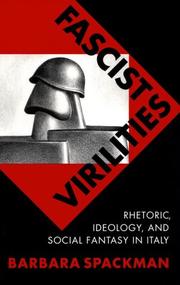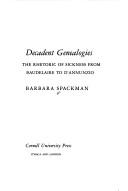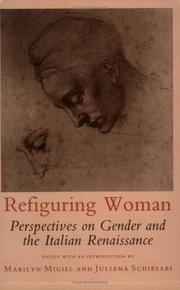| Listing 1 - 8 of 8 |
Sort by
|

ISBN: 0816627878 081662786X 9780816627868 9780816627875 0816687323 Year: 1996 Publisher: Minneapolis University of Minnesota Press
Abstract | Keywords | Export | Availability | Bookmark
 Loading...
Loading...Choose an application
- Reference Manager
- EndNote
- RefWorks (Direct export to RefWorks)
Thematology --- Political philosophy. Social philosophy --- History of Italy --- Psychological study of literature --- anno 1900-1999 --- Fascism and sex --- Fascism and women --- Fascism --- Masculinity --- Rhetoric --- Psychological aspects. --- Political aspects --- Women and fascism --- Women --- Masculinity (Psychology) --- Sex (Psychology) --- Men --- Sex and fascism --- Sex --- Neo-fascism --- Authoritarianism --- Collectivism --- Corporate state --- National socialism --- Synarchism --- Totalitarianism --- Italy --- Politics and government --- Psychological aspects --- Language and languages --- Speaking --- Authorship --- Expression --- Literary style --- 1922-1945 --- Masculinity (Psychology) - Italy. --- Rhetoric - Political aspects - Italy. --- Fascism and sex - Italy. --- Fascism - Italy - Psychological aspects.

ISBN: 0801422906 9781501723308 1501723308 9780801422904 1501723316 Year: 2018 Publisher: Cornell University Press
Abstract | Keywords | Export | Availability | Bookmark
 Loading...
Loading...Choose an application
- Reference Manager
- EndNote
- RefWorks (Direct export to RefWorks)
Barbara Spackman here examines the ways in which decadent writers adopted the language of physiological illness and alteration as a figure for psychic otherness. By means of an ideological and rhetorical analysis of scientific as well as literary texts, she shows how the rhetoric of sickness provided the male decadent writer with an alibi for the occupation and appropriation of the female body.
Comparative literature --- Thematology --- Decadence (Literary movement) --- Decadence in literature. --- Literature --- Literature, Modern --- Mental illness in literature. --- Psychology. --- History and criticism. --- Decadence (Literary movement). --- LITERARY CRITICISM / European / Italian. --- Insanity in literature --- Psychopathology in literature --- Literary movements --- History and criticism --- History of medicine
Book
ISBN: 1786948087 1786940205 1800855737 9781786948083 9781786940209 9781786940209 Year: 2017 Publisher: Liverpool
Abstract | Keywords | Export | Availability | Bookmark
 Loading...
Loading...Choose an application
- Reference Manager
- EndNote
- RefWorks (Direct export to RefWorks)
This book identifies a strand of what it calls "Accidental Orientalism" in narratives by Italians who found themselves in Ottoman Egypt and Anatolia in the late nineteenth and early twentieth centuries through historical accident and who wrote about their experiences in Italian, English, and French. Among them are young woman, Amalia Nizzoli, who learned Arabic, conversed the inhabitants of an Ottoman-Egpytian harem, and wrote a memoir in Italian; a young man, Giovanni Finati, who converted to Islam, passed as Albanian in Muhammad Ali's Egypt, and published his memoir in English; a strongman turned antiquarian, Giovanni Belzoni, whose narrative account in English documents the looting of antiquities by Europeans in Egypt ; a princess and patriot, Cristina Trivulzio di Belgiojoso, who lived in exile in Anatolia and wrote in French condemning the Ottoman harem and proposing social reforms in in the Ottoman empire; and an early twentieth century anarchist and anti-colonialist, Leda Rafanelli, who converted to Islam, wrote prolifically, and posed before the camera in an Orient of her own fashioning. Crossing class, gender, dress, and religious boundaries as they move about the Mediterranean basin, their accounts variously reconfigure, reconsolidate, and often destabilize the imagined East-West divide. Ranging widely on an affective spectrum from Islamophobia to Islamophilia, their narratives are the occasion for the book's reflection on the practices of cultural cross-dressing, conversion to Islam, and passing and posing as Muslim on the part of Italians who had themselves the object of an Orientalization on the part of Northern Europeans, and whose language had long been the lingua franca of the Mediterranean.
Italians --- Ethnology --- History --- Middle East --- Asia, South West --- Asia, Southwest --- Asia, West --- Asia, Western --- East (Middle East) --- Eastern Mediterranean --- Fertile Crescent --- Levant --- Mediterranean Region, Eastern --- Mideast --- Near East --- Northern Tier (Middle East) --- South West Asia --- Southwest Asia --- West Asia --- Western Asia --- Orient --- Civilization
Book
Year: 2018 Publisher: Ithaca : Cornell University Press,
Abstract | Keywords | Export | Availability | Bookmark
 Loading...
Loading...Choose an application
- Reference Manager
- EndNote
- RefWorks (Direct export to RefWorks)
Book
Year: 2018 Publisher: Ithaca : Cornell University Press,
Abstract | Keywords | Export | Availability | Bookmark
 Loading...
Loading...Choose an application
- Reference Manager
- EndNote
- RefWorks (Direct export to RefWorks)
Book
Year: 2018 Publisher: Ithaca : Cornell University Press,
Abstract | Keywords | Export | Availability | Bookmark
 Loading...
Loading...Choose an application
- Reference Manager
- EndNote
- RefWorks (Direct export to RefWorks)


ISBN: 0801425387 080149771X Year: 1991 Publisher: Ithaca, N.Y. Cornell University Press
Abstract | Keywords | Export | Availability | Bookmark
 Loading...
Loading...Choose an application
- Reference Manager
- EndNote
- RefWorks (Direct export to RefWorks)
Book

ISBN: 9781501737220 Year: 2019 Publisher: Ithaca, NY
Abstract | Keywords | Export | Availability | Bookmark
 Loading...
Loading...Choose an application
- Reference Manager
- EndNote
- RefWorks (Direct export to RefWorks)
| Listing 1 - 8 of 8 |
Sort by
|

 Search
Search Feedback
Feedback About UniCat
About UniCat  Help
Help News
News